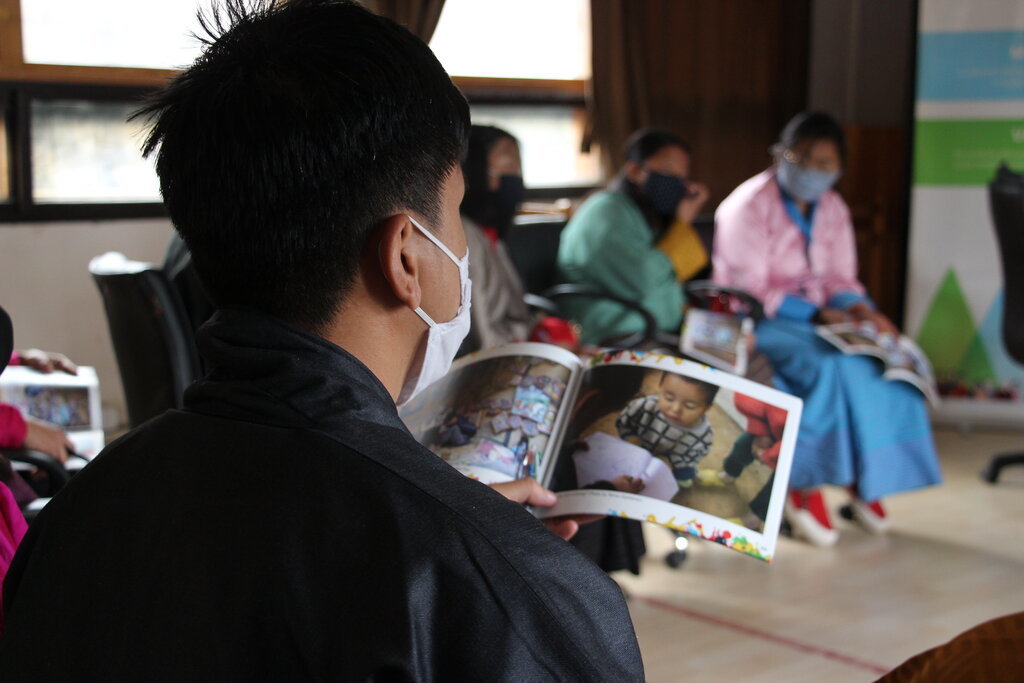By Zulkee Choden Rinzin | Assistant Communications Officer
Photography Basics and Beyond
The Basic Photography Training encouraged the participants to share their diverse perspectives on the COVID-19 pandemic through photography. Over the course of 5 days, 13 participants learnt about the fundamentals of photography, visual storytelling and photography ethics.
The participants were able to capture in photographs their reflections and the impacts of the pandemic. It included reflections on issues such as food sufficiency, reliance on imported labours, and the importance of human and spiritual connections to get through difficult times among others. At the closing event, joined by their family and friends, showcased the participants’ photographs.
During the presentation, Tshering a student from Motithang Higher Secondary School said, “I came to the photography training only expecting to learn how to take photos, however, during the training, I learnt that photography is also about telling stories.”
Jigme, the principal of Motithang High School remarked that 2020 was a difficult time for schools and the youth as there were literally no youth engagement programmes. She welcomed the fact that the Media Lab is now open to the youth.
Multimedia Education for Students
“The students are lucky to be availing these multimedia sessions because when I was a student, there were limited opportunities to pursue my interest in multimedia,” says Siseer, the trainer for the Photography Basics sessions.
The successful partnerships in the last two years with Motithang Higher Secondary School have benefitted the Media Studies students with access to BCMD’s multimedia equipment, software and classes, which is also being continued this year.
The first session on Photography Basics commenced in April, where 72 Media Studies students from Class 12 learnt about the techniques involved when taking photographs, which was complemented by the practical sessions. Thinley, a student from 12 Arts enjoyed the practical sessions and expressed that she looks forward to learning more about multimedia in the following months. The engaging hands-on experience provides the students with a chance to put their learnings into practice.
The sessions will span over the school calendar, and the students will be involved in working on different projects to showcase the learnings of the class.
Davos Lab Dialogues
The Davos Lab Dialogue builds on the momentum generated from Reset! at The Media Lab conversation series conducted at the end of 2020. The Dialogues provide a space and platform to inspire, empower and connect young people around the world in addressing the COVID-19 pandemic through a grassroots response to shape the future. The Dialogue was carried out in partnership with Global Shapers Thimphu Hub and focused on themes such as Digital Literacy and the Future of Politics.
1. Digital Literacy
Views on the current digital consumption and behaviour scenario were discussed which revealed some insights into the lack of awareness on privacy and rights as digital citizens. Speakers also highlighted the need to exercise our responsibility and ethics while generating and consuming information online as citizens. Although policies/legislations can help reduce the incitement of online threats/misuse, individual responsibility is a crucial aspect of digital literacy as well as targeting media literacy programmes to the most vulnerable sections of our population.
2. Future of Politics
Some of the suggestions for what the future of politics and future politicians could look like generated some interesting insights; the need to contextualise ourselves within the fourth industrial revolution helped support the need for future politicians to be flexible, open-minded, calculated risk-taker, and be well-versed in the digital realm. A speaker also emphasised that politics should unite people under one umbrella rather than creating divisions: “We are looking forward to a time where people unanimously come together in spirit and action to elect the right candidates and form the right government”.
Another speaker also mentioned that decision-makers must do away with the “Alu Zhoem (Young people) with no/less experience” mentality because the policies they are making at the moment will affect the youth in the near future. This only mandates the need to have consultations/dialogues between the people including the younger people and their representatives.
We thank CISU for their continued support of multimedia education for the youth of Bhutan.
Links:
Project reports on GlobalGiving are posted directly to globalgiving.org by Project Leaders as they are completed, generally every 3-4 months. To protect the integrity of these documents, GlobalGiving does not alter them; therefore you may find some language or formatting issues.
If you donate to this project or have donated to this project, you can receive an email when this project posts a report. You can also subscribe for reports without donating.
Support this important cause by creating a personalized fundraising page.
Start a Fundraiser